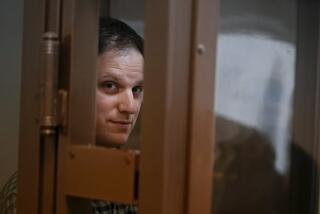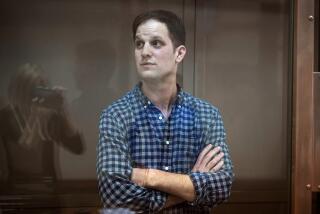In Kosovo, U.S. Envoy Hears Dire Warnings
- Share via
BELGRADE, Yugoslavia — Dispatched on an emergency mission to avert war in Serbia’s Kosovo province, U.S. envoy Richard Holbrooke heard dire warnings from ethnic Albanian leaders Sunday and then attempted to enlist the help of the Albanian government.
As sporadic fighting between ethnic Albanian guerrillas and Serbian police claimed more casualties, Holbrooke, architect of the peace accords that ended the war in Bosnia-Herzegovina, quickly got a look at how far apart the two sides remain.
He conceded that he did not have a solution to offer, noting that the Kosovo crisis is in many ways more complicated than Bosnia.
Ibrahim Rugova, head of the ethnic Albanian community that makes up 90% of Kosovo’s population, pressed demands for independence from Serbia in meetings Sunday with Holbrooke and special Balkans envoy Robert Gelbard. On Saturday, Holbrooke failed to persuade Yugoslav President Slobodan Milosevic to open talks with the Albanians under the supervision of foreign mediators.
Holbrooke flew Sunday afternoon to Tirana, the capital of Albania proper, where he consulted with Prime Minister Fatos Nano. Serb-dominated Yugoslavia has accused the Tirana government of supporting the rebels in Kosovo with training and arms.
“All three of the leaders agreed on one thing: The situation is dangerous,” Holbrooke told reporters in Tirana. “After that agreement, of course, there is no agreement on what to do next.”
He added that the escalating violence in Kosovo--Serbia’s southernmost province, which borders Albania--has created an “extraordinarily dangerous situation.”
Alarmed at the prospect of a new war spreading through the Balkans, Washington sent Holbrooke into the Kosovo morass as the U.S. and four West European governments froze foreign investment in Serbia, in the latest twist of a tightening vise of economic sanctions designed to punish the Milosevic regime.
The West does not support the Kosovo Albanians’ plea for independence. But the Serbian government’s fierce crackdown on armed guerrillas has pushed more and more once-passive Albanians to the cause of independence at any cost.
*
In Pristina, Kosovo’s provincial capital, Holbrooke said Rugova and his associates had warned him that “violence is spreading like wildfire” and that the situation is deteriorating by the day and in need of immediate international action.
“While I would not describe the effort we are engaged in as a formal negotiation, it is nonetheless a discussion, and the issues are very complicated,” Holbrooke said of his talks. “We are not presenting a U.S. plan. We are here to listen and learn, and what we’ve heard here has been very useful.”
The American delegation then paid a visit to the Gracanica monastery outside Pristina. Serbs value Kosovo as the cradle of their civilization, and the region is dotted with Serbian Orthodox monasteries and churches.
Holbrooke’s 4 1/2-hour meeting on Saturday with Milosevic in Belgrade, the Yugoslav and Serbian capital, similarly produced no results. Milosevic reiterated his rejection of international mediation in the Kosovo crisis--something the Albanians are insisting on--and argued that Kosovo is a purely internal matter.
“Our country will not accept a policy of pressures being used against it,” Milosevic said later in a statement released through the official Tanjug news agency. He condemned what he called the “biases” of certain countries that favor “Albanian terrorists.”
Holbrooke, currently a Wall Street banker whose name is being mentioned as the possible next ambassador to the United Nations, is scheduled to meet with Milosevic again today.
He developed a gregariously cordial relationship with the Serbian leader during the arduous Bosnia peace negotiations that led to the 1995 accords. The two men share a taste for fine food, whiskey and cigars. Holbrooke is widely seen as one of the few Western diplomats who can extract cooperation from Milosevic.
Since the war ended, however, Milosevic has become more mercurial and unpredictable, and it is far from clear that Holbrooke can have the same success now.
*
On Sunday, reaction to his visit in Belgrade was already negative. Milosevic’s allies, as expected, lambasted foreign interference as part of a conspiracy to destroy Yugoslavia. But even progressive thinkers saw the pitfalls of the Holbrooke mediation.
“This kind of mission only keeps Milosevic in good shape,” independent columnist Stojan Cerovic wrote for today’s Nasa Borba newspaper. “As long as diplomats are visiting him, asking the same questions and repeating the same positions, Milosevic feels that he is in the game and they count on him, and, for him, that’s the main thing.”
More to Read
Sign up for Essential California
The most important California stories and recommendations in your inbox every morning.
You may occasionally receive promotional content from the Los Angeles Times.














